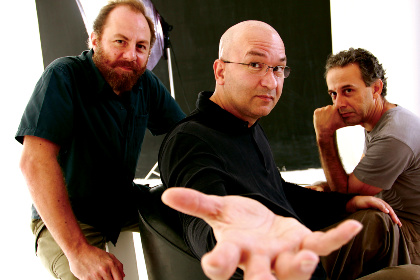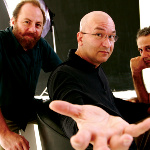- country:Brazil
- region:Rio de Janeiro
- style(s):Pop, Ska
- label:not signed
- type:Band
- instrumentation:instrumental, vocal
- artist posted by:Babel Produções Artisticas
Line up
- Bi Ribeiro (Bass)
- Herbert Vianna (Guitar & Vocal)
- João Barone (Drums)
PARALAMAS first record, CINEMA MUDO, released in 1983, quickly revealed musical tendencies that would soon grow into fortified strehgths. Herbert Vianna, the group's main composer, guitarist and singer, defines their approach as a "fusion of rock, of reggaes, and this intention of using more Brazilian elements, this love of Brazilian folklore." He is joined in the endeavor by Bi Ribeiro on bass and Joao Barone on drums. Barone now calls them "a trio of seven" since they've added keyboards and a sizzling brass section.
With their second album, PASSO DO LUI (1985) and their exuberant success in the first Rock In Rio Festival, they began traveling extensively throughout Brazil. "And so we began to hear the most regional of Brazilian forms", says Vianna, "some of which were rigorously identical to the African music we had been listening to. Incredibely enough, what had attracted us to 2-tone was something we ended up discovering in Brazil itself", he muses. Impressed by these connections, PARALAMAS set upon a path that distinguishes them once and for all from their counterparts.
Being open at all to the African roots of Brazilian culture was something that this generation of Brazilian musicians and their public had all but abandoned. PARALAMAS not only looked to them, they became inspired by them. The Afro-Brazilian links became points of departure for a journey back home again. "We started to see our own music with a foreigner's eyes, to explore these things and mix them into our music". The disk that resulted was SELVAGEM? (1986). What it offered had repercussions that exhoed all over Brazil. The press hailed them as the future of Brazilian rock while the present of Brazilian rock went on the counter-attack. The public didn't buy the criticism, though they did buy the album, PARALAMAS achieved double-platinum status (more than 500.000 copies sold).
While other groups turned in disks that were ever-more anglo in content, some even singing in English, PARALAMAS delved even deeper into Brazilian forms. The further they looked, the more they discovered. "Truly", says Vianna, "Brazil doesn't have any one style of cultural aesthetic that is uniquely and solely typical, since Brazil isn't one country it's twenty countries in one. So I think that our music that offers the truest
Brazilian character is that has the richest mistures of incluences: the African, Brazilian jazz, bossa nova, some rock'n roll".
PARALAMAS certainly don't deny their obvious debt to rock. "In Brazil it's inevitable to grow up hearing rock", Vianna freely admits. "I began playing guitar because of Cream, Led Zeppelin, Jimi Hendrix, Jeff Beck, all of that. So it's inevitable that we are strongly influenced by rock and we acknowledge this. "And they certainly weren't the first to wed rock to Brazilian music - Caetano Veloso and Gilberto Gil's Tropicalia movement of the late sixties let the way. "Tropicalia suggested various options that can still be explored", says Vianna, who still explores them. He calls his recent solo album a reflection of this "Tropicalia phase".
But this healthy process of influence and adaptation seems to have gotten lost to succeeding generations. All except to PARALAMAS, that is who with great originality updated a process that has characterized Brazilian music from its very inception: this knack for speaking the broadest variety of foreign musical tongues with distinctly Brazilian accents. Theis phenomenal popularity in Brazil is the result, and it is earning them fans throughout Latin and North America, Europe and Japan.
The last three years have been almost entirely on the road. Show after show all across the world, including an European tour with Brian May (June/July 1993).
With so much information and so many points of reference gathered over this period, nothing more natural than the simultaneous release of two new records: SEVERINO and DOS MARGARITAS the first destined for the Brazilian market and the latter for Latin territories. (DOS MARGARITAS went gold in its first week on the charts in Argentina).
Recorded and mixed between December 93 and February 94, for the first time PARALAMAS worked with a foreign producer, Phil Manzanera (Roxy Music), at Phil's Gallery Studios in England, both records clearly show maturity and talent for much more to come.
VAMO BATE LATA, their album released on July 95, brought PARALAMAS back to the top of the hit parades throughout Brazil and Latin American countries, achieving significant sales figures in Brazil (more than 900.000 copies sold - PARALAMAS's biggest success to date: triple platinum status), as well as in Argentina (more than 70.000 copies sold - platinun status), Uruguay, Chile and Portugal.
The video "Uma Brasileira" got several awards at the 1st MTV Brazil Music Awards, including best videoclip of the year.
Three letters. Pop. 9 LUAS (9 Moons). Pop. This is the word that better describes PARALAMAS newest album. Recorded in Rio de Janeiro and mixed at The Enterprise Studio (Los Angeles) by Brad Gilderman in June 96, 9 LUAS brings back the group to their origin.
PARALAMAS received again the award of best videoclip of the year at the 2nd MTV Brazil Music Awards for their "Busca Vida".
In 1997 EMI Brasil decided to remaster PARALAMAS complete discography at the Abbey Road Studios (London) and prepared a special release: their 8 CDs (1983 / 1994) were reunited in a special limited edition titled POLVORA.
Between concerts and rehearsals, PARALAMAS recorded a new album. Mixed at the Peter Gabriel's Real World Studios (Box/England) and mastered at the Abbey Road Studios (London), HEY NA NA was released in April 1998 and achieved platinum status (more than 250.000 units sold) in Brasil in a week.
Once more the group had a video awarded as the best videoclip of the year at the 3rd MTV Brazil Music Awards, it was "Ela Disse Adeus".
After woking for two years to reach what they consider the ideal point for the format, in July 1999, PARALAMAS finally presents their "UNPLUGGED MTV". Bi Ribeiro, Herbert Vianna and Joao Barone made an important decision: the unplugged would be done exclusively by the PARALAMAS sound plat, a cohesive band of 8 musicians refined in a work philosophy that gives privilege to the non-stop, on-the-road type of work where interruptions never last more than 3 weeks. The repertoire of 21 songs aims to project flashes of light over musical aspects, which did not receive proper exposure during their 16-year-old phonographic career.
"I think na Unpluged can sometimes fall into a 'let-me-explain-my-work' mode. We don't have that kind of thing, there's nothing to be explained. We have the will to emphasize the things we believe in and because they're not played on the radio, many times go unnoticed. ", says Herbert Vianna.
Of the bands that appeared in the 80's, under the general label of representatives of the Brazilian rock movement, PARALAMAS is the one which had and continued to develop a deeper involvement with exhuberant rhythms, mixing Latin music together with influences of reggae, toast, salsa and ska. But after all, PARALAMAS is a Brazilian group that continues to be inspired by one of the most inspiring musical cultures on the planet: that of Brazil.
DISCOGRAPHY
CINEMA MUDO 1983
PASSO DO LUI 1985
SELVAGEM 1986
D 1987
BORA BORA 1988
BIG BANG 1989
ARQUIVO1990
GRAOS 1991
SEVERINO 1994
VAMO BATE LATA 1995
9 LUAS 1996
POLVORA1997
HEY NA NA 1998
MTV UNPLUGGED 1999
ARQUIVO II 2000
LONGO CAMINHO 2002
UNS DIAS (Live)2004
HOJE 2005
BRASIL AFORA 2009



